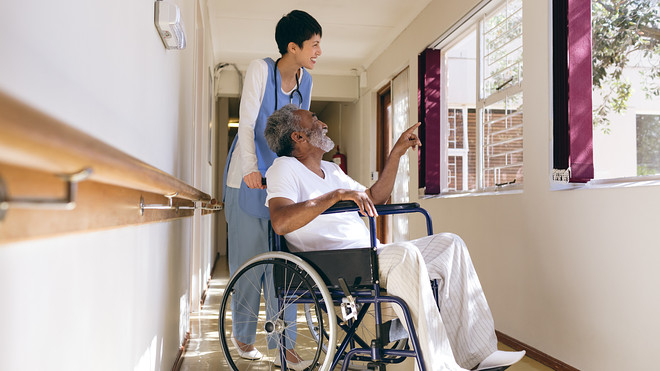CHICAGO, IL – Vaccination campaigns and reduced COVID-19 transmission may soon bring visitors back to nursing homes, but one state is using legislation to wedge the doors open now.
The Essential Family Caregiver Guidance program allows residents to appoint up to two caregivers who can enter their nursing home facility to help with meals, grooming, and companionship – even when a community spread or positive test in the building may otherwise keep guests out. The program is being overseen by the state health department.
Who Qualifies as an “Essential Caregiver?”
Essential caregivers are not general visitors. These individuals meet an essential need for the resident by assisting with activities of daily living or positively influencing the behavior of a resident. The goal is to help ensure high-risk residents continue to receive individualized, person-centered care.
Guidance by the Illinois Department of Public Health (IDPH) states:
- The facility should establish policies and procedures for how to designate and utilize essential workers (EC) that include visitation parameters and a process for communication with residents and families.
- The facility should encourage visits by ECs except during outbreak situations in the facility or when the resident being provided essential care has tested positive or is symptomatic for COVID-19. At such times, the administrator or director of nursing home should determine if EC visits are appropriate or can be considered under compassionate care visitation.
- The facility should permit flexibility in scheduling EC visits, such as allowing evening and weekend visits, to accommodate the needs of the resident and the EC.
- The facility may establish time limits as needed to keep residents safe. Scheduling of EC visits may consider the number of ECs in the building at the same time.
- The facility must consult the resident or guardian to determine whether the resident or guardian wants to designate someone as an EC. Consider family members, outside caregivers, friends, or volunteers who provided regular care and support to the resident prior to the pandemic. Individuals may also be designated if different care needs arise (e.g., significant change in condition resulting from a fall, weight loss, or change in mental or psychosocial status).
- Residents may designate more than on EC based on needs (e.g., more than one family member may split time to provide care for the resident). If multiple ECs are designated, a schedule should be established by the administrator or director of nursing, in collaboration with the ECs and resident.
- The EC will maintain a distance of at least 6 feet from other residents and staff and wear appropriate PPE when they are in the facility.
- ECs must be screened, tested, and provided PPE in accordance with the health care personnel guidance in the facility’s COVID-19 plan. The facility must document that it has trained the EC on proper infection control, including hand hygiene and appropriate use of PPE. Long-term care facilities licensed by IDPH must test ECs for COVID-19 as required by emergency rule.
- The EC will provide care and support in the resident’s room or in facility-designated areas within the building. The EC must limit movement in the facility and ensure separation from other residents in shared rooms by use of curtains or partitions.
- The EC may take the resident outdoors, while wearing appropriate PPE. The resident should wear a face covering, as tolerated. The EC should not take the resident off campus, expect in accordance with the IDPH Reopening Guidance.
- If the EC fails to appropriate use of PPE, social distancing from other residents and staff, other COVID-19 related rules, or any other facility policies, the facility may restrict or revoke EC visits. Facility staff must first discuss the violation and the necessary corrective action with the EC and resident prior to instituting any restriction or revocation of EC visits.
Indiana is the only state considering a bill that would require all 534 of the state’s skilled nursing facilities to participate in an Essential Family Caregivers Program.
Zach Cattell, president of the Indiana Health Care Association, told McKnights, “At the end of the day, administrators, nurses, the folks who provide this hands-on care, they want to protect their residents… We also want highly involved family members. We want our communities to be open. These are peoples homes.”
A Model for Others?
It’s unclear how many states are considering similar legislation fixes while waiting.
In Pennsylvania, a 400-member group rallied around the state capitol demanding lawmakers to expand visitation rights to nursing home residents.
The American Health Care Association stressed the need to remain vigilant about infection control as restrictions ease.



